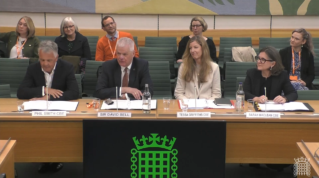The government’s new skills quango has published its first report that outlines the “long list of challenges” to fix and the “fragmented and confusing” skills system.
Skills England’s inaugural report, which interim chair Richard Pennycook said, “does nothing more than set the scene”, assured that the new body will “bring HE and FE systems closer together” and join up decision making across the department.
Education secretary Bridget Phillipson said Skills England will “shape” the government’s response to skills needs and provide a “structured feedback loop” to inform funding and policy decisions.
The body is currently advertising for a permanent chair and board, so today’s 64-page report would have been written mostly by Department for Education civil servants and Pennycook, who himself is a DfE non-executive director.
Here’s FE Week’s roundup of the report.
Skills England to ‘collaborate intensively’
When it was announced in the King’s Speech in July, Number 10 said the aim of the Skills England will be to “bring together businesses, providers, unions, mayoral combined authorities (MCAs) and national government to ensure we have the highly trained workforce that England needs”.
Pennycook said in the report that the new body will “collaborate intensively with our colleagues across government and in the regions”.
Skills England will also work with the Industrial Strategy Council (ISC), trade unions and local leaders on the introduction of a new Industrial Strategy.
“The Industrial Strategy will aim to secure investment into crucial sectors of the economy to drive long-term sustainable, inclusive and secure growth,” the report said.
Pennycook added that it will also work with the devolved nations for more “effective” data sharing and a better understanding of the UK labour market to inform its skills policy decisions.
He said: “Whilst we are called Skills England, the UK’s skills needs do not change or stop at Carlisle or Chepstow. We will work closely with our colleagues in the devolved nations to ensure that students and employers (the customers of our system) have a seamless experience throughout the four nations.”
Cross-departmental work is also promised as the Department for Work and Pensions and his Treasury will input on a forthcoming white paper called ‘Get Britain Working’ on how to prevent economic inactivity for people looking to return to work and the Department for Energy Security and Net Zero and the Office for Clean Energy Jobs will feed into green skills jobs needs.
‘Building on the progress’ of IfATE
The King’s speech also announced that powers from the Institute for Apprenticeships and Technical Education (IfATE) will be transferred to Skills England, with the former expected to close when its successor is fully operational.
“Working with the Department for Education, Skills England will ensure that there is a comprehensive suite of apprenticeships, training and technical qualifications for individuals and employers to access that are aligned with skills needs, building on the progress made by IfATE,” today’s report said.
Legacy of skills gaps
The report acknowledged the decline in training expenditure over a decade – which is at its lowest level since records began in 2011, with investment per employee down by 19 per cent in real terms – local level economic disparities and tight labour market conditions causing difficulties in hiring suitably skilled workers and an overall “legacy of large skills gaps”.
“There is clear evidence of a gap between the skills demanded by employers and the skills supplied by the system and possessed by individuals, i.e. a skills mismatch,” the document added.
It also found that, across the UK, almost 1 in 10, or over 2.5 million roles are in critical demand, with more than 90 per cent being in roles that require training or education.
Looking to future skills needs, Skills England said it would conduct analysis to estimate future job projections and create a new measure capturing current labour demand – the Occupations in Demand index. It has already identified essential job roles for the future such as AI cyber security and heat pump installation jobs.
The report said: “Heat pump installation is an example of a clean energy workforce that will need to expand. The workforce is estimated to be in line with current demand but will need to grow significantly to meet rapid increases in future demand. The Heat Pump Association estimates that the number of full-time equivalent heat pump installers would need to increase from 2k in 2020 to 35k to keep up with future demand.”
The body will also coordinate with government departments to define the “priority” workforces that they are responsible for or reliant on.
Next steps
This autumn, Skills England said it will build on its early engagement with stakeholders by conducting a series of roundtables and webinars in the autumn to “further test and refine the initial assessment of skills needs”.
The body will also undertake and share further analysis building on the work previously led by the Unit for Future Skills. This will include mapping occupations onto education pathways to understand the most common routes into priority professions and working with the Office for National Statistics on their development of online job adverts.
Skills England will be consulting employers and others for their input on what training should be accessible through the growth and skills levy and will work closely with the Migration Advisory Committee to grow the domestic skills pipeline.

















Productivity – 49 mentions
Growth – 109
Level – 68
Green – 47
Local – 61
National – 43
People – 35 (Young – 14)
Then:
Quality – 16
Fund & funding – 15
Outcomes – 8
Budget – 1